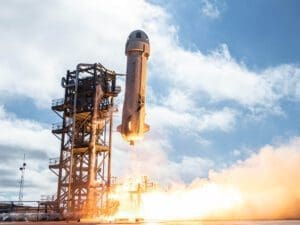 Who wouldn’t like to go to space? For billionaires, it is now a reality instead of a rhetorical question. As my colleague Steve Banker pointed out earlier this week, billionaire egotism trumps sustainability, as Richard Branson, Jeff Bezos, Elon Musk, and others battle it out to get to space first. Earlier this week, Jeff Bezos and three crewmates (one of which paid $28 million to join the flight in an auction) reached heights of 66.5 miles above Earth on the New Shepard rocket, experiencing four minutes of weightlessness. In that time, Bezos and his crew “did somersaults, played catch with a ping pong ball, and snacked on Skittles.” The capsule touched down with the help of parachutes following a little over 10-minute journey. The company said it plans to launch two more flights with commercial customers this year. We can only begin to imagine the costs and environmental effect of these launches. And now on to this week’s logistics news.
Who wouldn’t like to go to space? For billionaires, it is now a reality instead of a rhetorical question. As my colleague Steve Banker pointed out earlier this week, billionaire egotism trumps sustainability, as Richard Branson, Jeff Bezos, Elon Musk, and others battle it out to get to space first. Earlier this week, Jeff Bezos and three crewmates (one of which paid $28 million to join the flight in an auction) reached heights of 66.5 miles above Earth on the New Shepard rocket, experiencing four minutes of weightlessness. In that time, Bezos and his crew “did somersaults, played catch with a ping pong ball, and snacked on Skittles.” The capsule touched down with the help of parachutes following a little over 10-minute journey. The company said it plans to launch two more flights with commercial customers this year. We can only begin to imagine the costs and environmental effect of these launches. And now on to this week’s logistics news.
- Uber Freight to acquire Transplace
- Walmart partners with Symbotic to advance warehouse automation
- Procter & Gamble expands robotic ambitions
- Amazon’s Climate Pledge Friendly badges are off to a slow start
- Uber Eats extends grocery delivery reach with Albertsons
- India’s Delhivery bags $100 million from FedEx
- House Appropriations Committee approves transportation funding bill
- North Carolina’s largest city running short on liquor
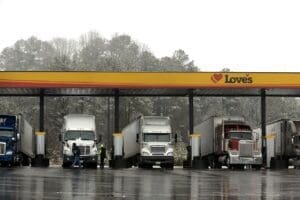 Uber Freight is making a big push to grow its business, carve out more market share, and become profitable. Yesterday, the company announced that it is acquiring Transplace, a non-asset-based logistics technology and services company that offers both TMS and managed services for global shippers. The acquisition will cost Uber Freight about $2.25 billion and will involve $750 million in Uber stock with the remainder in cash. The union will fold one of the largest managed transportation and logistics networks into Uber Freight’s platform, which connects truck drivers with shippers that need cargo delivered. Uber Freight’s brokerage will continue to operate independently from Transplace’s services, the company said.
Uber Freight is making a big push to grow its business, carve out more market share, and become profitable. Yesterday, the company announced that it is acquiring Transplace, a non-asset-based logistics technology and services company that offers both TMS and managed services for global shippers. The acquisition will cost Uber Freight about $2.25 billion and will involve $750 million in Uber stock with the remainder in cash. The union will fold one of the largest managed transportation and logistics networks into Uber Freight’s platform, which connects truck drivers with shippers that need cargo delivered. Uber Freight’s brokerage will continue to operate independently from Transplace’s services, the company said.
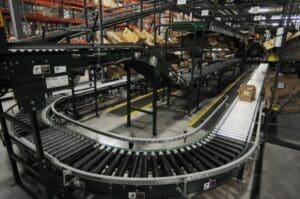 According to Walmart, the company will implement robotics technology from Wilmington, MA-based Symbotic in most of its regional distribution centers (RDCs) in a bid to “fundamentally alter how products get to stores.” According to the announcement, the new system uses high-speed robots to sort, store, and retrieve products at regional warehouses to load customized, store-ready, and aisle-ready pallets to make unloading and stocking more efficient when a product gets to Walmart stores. The big advantage of this partnership will be automating a previously manual process to create efficiencies. Symbotic’s automation system will be incorporated into 25 of Walmart’s 42 RDCs.
According to Walmart, the company will implement robotics technology from Wilmington, MA-based Symbotic in most of its regional distribution centers (RDCs) in a bid to “fundamentally alter how products get to stores.” According to the announcement, the new system uses high-speed robots to sort, store, and retrieve products at regional warehouses to load customized, store-ready, and aisle-ready pallets to make unloading and stocking more efficient when a product gets to Walmart stores. The big advantage of this partnership will be automating a previously manual process to create efficiencies. Symbotic’s automation system will be incorporated into 25 of Walmart’s 42 RDCs.
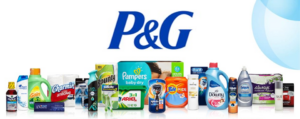 Speaking of robots, Procter & Gamble (P&G) is looking to expand its use of robotics to reduce labor intensive, manual processes performed by human workers. Currently, tasks such as putting toothpaste and skin lotion into packages is done by hand. However, at one of the company’s “secret robotics labs” on the outskirts of Cincinnati, researchers have programmed a robot to do the job. According to Mark Lewandowski, director of robotics innovation at P&G’s global engineering center, it is a tricky job for robots. The robot arm plucks two bottles at a time from a box and lays them into the dimples with the labels facing forward so they’re visible when the package is sealed. Apparently getting the labels oriented is the hardest part for the robots.
Speaking of robots, Procter & Gamble (P&G) is looking to expand its use of robotics to reduce labor intensive, manual processes performed by human workers. Currently, tasks such as putting toothpaste and skin lotion into packages is done by hand. However, at one of the company’s “secret robotics labs” on the outskirts of Cincinnati, researchers have programmed a robot to do the job. According to Mark Lewandowski, director of robotics innovation at P&G’s global engineering center, it is a tricky job for robots. The robot arm plucks two bottles at a time from a box and lays them into the dimples with the labels facing forward so they’re visible when the package is sealed. Apparently getting the labels oriented is the hardest part for the robots.
![]() Sustainability continues to be top of mind for consumers, and as a result, manufacturers and retailers alike. Last September, Amazon announced “Climate Pledge Friendly” badges as a part of a larger rollout of its company-wide sustainability goals, which involve getting to net zero carbon by 2040. Brands only have to receive one of the now 31 approved certifications across the US and EU — most of which require sellers to submit their products to outside organizations like Fairtrade or the Regenerative Organic Alliance for approval — in order to qualify for a climate-friendly logo. The original launch came with a high number of big-name partners, such as Seventh Generation, Burt’s Bees, and HP. Unfortunately, the program is off to a slow start as sellers cannot fill out a simple form to earn badges. While it is a great idea, Amazon needs to refine the process to get more sellers on board.
Sustainability continues to be top of mind for consumers, and as a result, manufacturers and retailers alike. Last September, Amazon announced “Climate Pledge Friendly” badges as a part of a larger rollout of its company-wide sustainability goals, which involve getting to net zero carbon by 2040. Brands only have to receive one of the now 31 approved certifications across the US and EU — most of which require sellers to submit their products to outside organizations like Fairtrade or the Regenerative Organic Alliance for approval — in order to qualify for a climate-friendly logo. The original launch came with a high number of big-name partners, such as Seventh Generation, Burt’s Bees, and HP. Unfortunately, the program is off to a slow start as sellers cannot fill out a simple form to earn badges. While it is a great idea, Amazon needs to refine the process to get more sellers on board.
Food delivery continues to grow in the US, with more and more retailers, grocery stores, and restaurants looking at the market as a potential growth area. This week Uber Eats announced a partnership with Albertsons for its on-demand delivery service. Uber said that Uber Eats grocery delivery is slated to roll out to 1,200 Albertsons stores this year. Albertsons customers, including brands such as Albertsons, Safeway, Jewel-Osco, Acme, Tom Thumb, and Randalls, among others, can access the online grocery and food delivery service via the Uber and Uber Eats apps. Uber Pass and Eats Pass users get free delivery for grocery orders over $30.
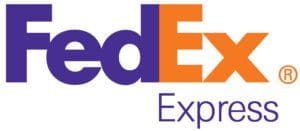 FedEx Express, a subsidiary of FedEx, is investing $100 million in Indian startup Delhivery as the global firm looks to expand its presence in the South Asian country. As part of the deal, the companies will enter into a long-term commercial agreement. FedEx Express will focus on international export and import services to and from India, and Delhivery will, in addition to FedEx, sell FedEx Express international products and services in the India market and provide pickup and delivery services across India. FedEx will transfer certain assets pertaining to its domestic business in India to Delhivery. Delhivery began its life as a food delivery firm but has since shifted to a full suite of logistics services in over 2,300 Indian cities and more than 17,500 zip codes.
FedEx Express, a subsidiary of FedEx, is investing $100 million in Indian startup Delhivery as the global firm looks to expand its presence in the South Asian country. As part of the deal, the companies will enter into a long-term commercial agreement. FedEx Express will focus on international export and import services to and from India, and Delhivery will, in addition to FedEx, sell FedEx Express international products and services in the India market and provide pickup and delivery services across India. FedEx will transfer certain assets pertaining to its domestic business in India to Delhivery. Delhivery began its life as a food delivery firm but has since shifted to a full suite of logistics services in over 2,300 Indian cities and more than 17,500 zip codes.
The House Appropriations Committee on Friday approved the FY 2022 Transportation, and Housing and Urban Development, and Related Agencies funding bill. For FY 2022, the bill provides a total of $105.7 billion in budgetary resources for the US Department of Transportation, which is an increase of $19 billion above the FY 2021 enacted level and $18.7 billion above the President’s 2022 budget request, the committee says. According to the committee, the legislation creates and leverages more than 150 million additional jobs in construction and related industries and invests more than $250 million to reduce transportation emissions, increase resiliency, and address historical inequities.
Back in April 2020, I examined the conflicting realities in the face of Covid-19. One area I looked at was the sale of alcohol. Liquor stores were deemed an essential business and allowed to remain open across the country. In the third week of March, alcohol sales shot up 55 percent compared to the same timeframe in 2019. But now, supply chain and labor shortages are impacting this market. Restaurants and bars in North Carolina’s largest city are scrambling to find popular brands of alcohol that have been depleted by supply chain issues and worker shortages. The Alcoholic Beverage Control (ABC) Commission is in contact with suppliers to ensure products are in stock and help local ABC boards find solutions to product issues, said commission spokesman Jeff Strickland. Sounds like it could be a long summer in NC.
That’s all for this week. Enjoy the weekend and the song of the week, Elton John’s Rocket Man.
















